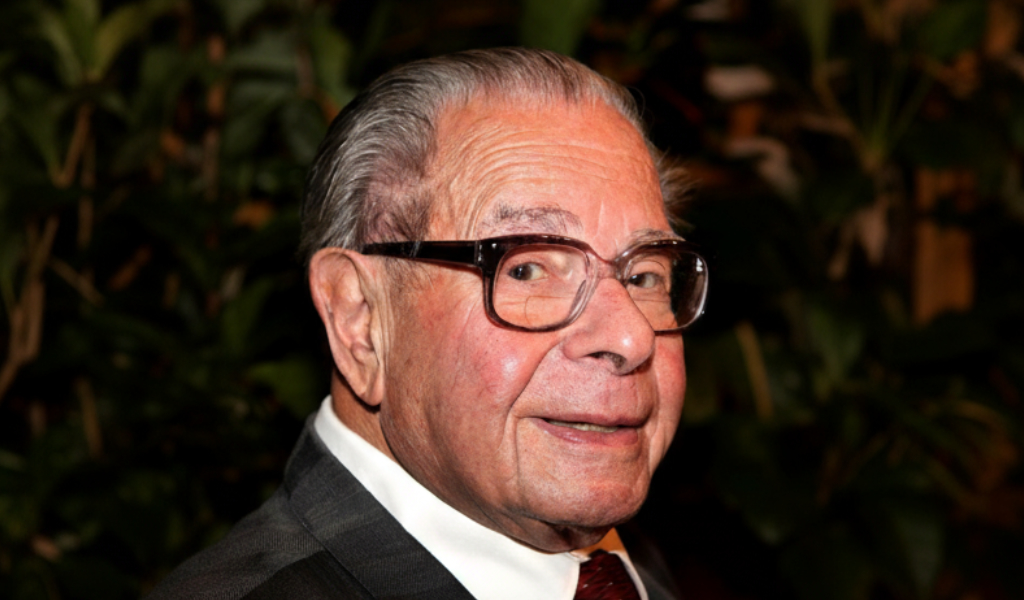From Heinrich Rothmund to Beat Jans
From Sacha Wigdorovits

Today, on October 30, 2025, my father would have been 100 years old. My father came to Switzerland from Hungary as a young student in 1947 to fulfill his most fervent wish: To complete his studies as an electrical engineer at the world-famous ETH in Zurich – which he then did.
My father already had a strong connection with Switzerland. It was a letter of protection issued by the Swiss vice-consul in Budapest, Carl Lutz, that had saved his life as a Jew in German-occupied Hungary. Until he was finally forced to flee underground to safety from the “Arrow Crossers”, the Hungarian Nazis.
The day after his arrival at Zurich main station, my father’s life began to take a turn for the better: In Wettingen, he met Branka Frank, a young Jewish woman from Yugoslavia – my mother.
She came to Switzerland with her mother, her two sisters and other close family members in August 1943. They arrived in Castasegna in Graubünden from Italy as illegal refugees. They were rescued by three Swiss soldiers who guided them to safety in Switzerland from no man’s land near the Italian border, shouting “Svizzera, Svizzera”.
A fourth soldier, a young Zurich lawyer named Veith Wyler, saved them the following day from being deported back to Italy, which was already occupied by the Germans at the time, and thus to certain death.
These four Swiss soldiers acted against the express orders of the Federal Council. Just as Carl Lutz, who saved the lives of over 60,000 Hungarian Jews with his policy of letters of protection, which was later also adopted by Sweden, had acted against official Swiss policy.
The same was done in St. Gallen by the local police commander Paul Grüninger, who also opposed this inhumane policy and saved thousands of Jewish refugees who had entered Switzerland illegally from death. And the population of Diepoldsau also acted against the orders of the Federal Council when they blocked the border crossing to Germany in 1942 so that the police could not deport 20 Jewish refugees back there.
All these Swiss citizens opposed the anti-Jewish and pro-Nazi policies of the Federal Council on the grounds of their Christian conscience and humanity. On the initiative of the then head of the immigration police, Heinrich Rothmund, the Federal Council had decided in 1938 to no longer accept Jewish refugees.
Later, the then Federal Councillor Eduard von Steiger defended this pro-Nazi policy with the notorious words: “The boat is full.”
However, the official reason given by the Federal Council and the immigration police at the time was that people who were persecuted for “racial” and not “political” reasons should not be recognized as refugees. To make this decision easier to implement, Switzerland asked the German government to affix the so-called “Jewish stamp” to the passports of German Jews.
In addition to the legal justification that the Jews, as “racially persecuted persons”, were not really refugees, the Federal Council also justified its policy with the cynical argument that taking in too many Jews would spread anti-Semitism in Switzerland.
As we can see today, this policy has not worked. Although there are just 18,000 Jews living in Switzerland – around 0.2 percent of the population – we are now confronted with an unprecedented level of anti-Semitism in our country.
On the streets and in universities, it manifests itself in calls for the destruction of Israel, which is disguised as a demand “from the river to the sea”. And by shouting “Death to the Jews”, who are now referred to as “Zionists” so as not to have to call them Jews.
But this anti-Semitism is once again supported and promoted by many politicians. However, there is one major difference to the 1930s and 1940s. Back then, it was the pro-German, national conservative circles that shaped Switzerland’s anti-Semitic attitude. Today, on the other hand, it is the Social Democrats and the Greens.
Naturally, these parties firmly reject the accusation of being anti-Semitic. After all, their policies are not directed against Jews in general, but “only” against Israel, they say.
This is verbal hair-splitting. Because anyone who denies the only Jewish state in the world the right to self-defense against Palestinian terrorists is denying the Jews the right to exist. No matter where.
The Palestinian-friendly left-wing politicians have adopted the hypocrisy of their Nazi-friendly bourgeois predecessors. Whereas back then they justified their anti-Jewish refugee policy by claiming that they wanted to protect Swiss Jews from anti-Semitism, today SP Federal Councillor Beat Jans claims that he is taking in injured children and their families from war-torn Gaza for reasons of humanity.
If Jans was really concerned with humanitarian aid, he would have made sure that the millions of francs that this action devours would be used locally and in neighboring countries for medical care, where they would be much more effective. Incidentally, children and adults from Gaza have always been treated in Israeli hospitals. Usually free of charge.
But Jans is not interested in helping at all. With his “shameful PR campaign” (Filippo Leutenegger, FDP cantonal president of Zurich), he wants to send a protest signal against Israel, which his party, the SP, has quite wrongly accused of committing “genocide” against the Palestinians.
In doing so, Jans goes one step further than his predecessors Eduard von Steiger and Giuseppe Motta and, as Chief of the Aliens Police, Heinrich Rothmund. At the time, they had merely prevented Switzerland from taking in persecuted Jews. Jans, on the other hand, with the Palestinian adults accompanying the children from Gaza, is taking in members of a population group whose declared aim is the extermination of Jews. And he does this knowingly.
I miss my parents very much. But I’m glad that they, who later became grateful and proud Swiss, no longer have to experience this.
This article also appeared on Nebelspalter.ch
Sacha Wigdorovits is President of the Fokus Israel und Nahost association, which runs the website fokusisrael.ch. He studied history, German and social psychology at the University of Zurich and has worked as a US correspondent for the SonntagsZeitung, was editor-in-chief of BLICK and co-founder of the commuter newspaper 20minuten.
Have you discovered an error?
